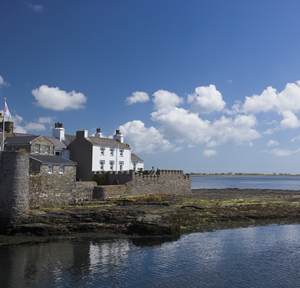Family Office
EXCLUSIVE GUEST COMMENT: Succession, Family Offices - And The Isle Of Man

One of the industry luminaries of the Isle of Man talks about family offices, succession - and the not unimportant matter of the island's tax regime.
The following article on issues surrounding family succession and family offices is by Ian Morley, London representative for the Isle of Man Funds Association. The views expressed are those of the author and not necessarily shared by the editors of this publication.
The Sunday Times Rich List has London as the location of choice for over one hundred billionaires. Sadly, I was not among them, even if counting in old Italian Lira!
What is most interesting when looking at who is on the list and also the accompanying list of the world’s richest is that increasingly the major modern fortunes belong to those who have made a great success in some form of business in relatively recent years. This means that many of them have both operating companies to manage and grow as well as funds to invest.
The days of mostly inherited land and old industrial linked wealth are still there as is wealth of those that won the lottery when national assets were being given away in some countries. However, the new dynamic is that of relatively young people creating wealth via new and often media related global businesses.
This situation presents a number of challenges for the increasing number of family offices around the world. How do you effectively manage and grow the existing business, preserve the excess wealth and train the next generation for the challenge of living with inherited wealth and managing businesses.
With the OECD and other national governments effectively ending the concept of offshore tax havens and efficiently blurring the difference between tax evasion and avoidance, it has been a real challenge for offshore Islands to remind everyone that they have mostly signed up to the various tax exchange agreements and fully support efforts to prevent tax evasion, while still being places of tax neutrality and choice for family offices to use for both investment and operating businesses.
The fact that last month, Pfizer of the US tried to buy AstraZeneca of the UK, for among other reasons, a lower tax bill is somehow overlooked in a world of modern duplicity, where major states attack offshore locations while supporting their own and simultaneously offering onshore tax advantages to major foreign firms to relocate.There are no simple answers for family offices but there are a number of alternative solutions. Those with operating businesses throwing off additional cash for investments may consider [supposedly] non-correlated investments to the core operating company, to diversify risk. This is an old fashioned but still effective policy to pursue. They may also be able to take some greater investment risks than those families with more mouths to feed and no business income to protect them from poor investments.
A major conundrum is whether the brains behind the fortune is best positioned to manage the operating company as well as the investments fund or structure? Again, there is no simple answer, but often the skill set of an entrepreneur is not the same as an investment manager. The maths are fairly simple. If the investment fortune is about £100 million then there is enough to pay for quality family office management that will manage the money and have to be able to explain and at times stand up to the personal and business power of the founder. Not always an easy job.
While death and taxes are two things best avoided where legally allowed, we all have a tendency to assume that we will be here forever, irrespective of others mortality. For the new family office there is help at hand. Generational family offices have learned much and can offer experience based advice.
As the old Crosby, Stills and Nash song goes: Teach your children well. Teach them about money but don’t give them too much to live without working. Transfer power to them, if not full ownership, slowly. Let them prove themselves capable and not just entitled. Do not force the favourite child to take over the business. Instead encourage the one most interested and with the best aptitude. Be generous and try to do good. There is much complexity in philanthropy and it is best to consider the impact and difference you want to make very carefully. Above all try not to use the power of money as a tool of family manipulation. It may work for a while but in the end it will probably destroy the legacy you are trying to create and perpetuate.
All the UK crown dependencies are essentially tax neutral and open for business. The Isle of Man interestingly and exceptionally has, under a Customs and Excise Agreement with the UK, retained a VAT regime that is fundamentally the same as that of the UK. This is recognised under European legislation and provides that the IOM, whilst not being a member state of the EU, is treated as such for Customs and Excise purposes.
Families with operating businesses trading goods all over Europe can use the IOM for all their VAT requirements and obtain automated customs clearance for goods imported into either the UK or IOM. International firms, like Linso Digital technology, have seen the benefit of this as have other family run businesses, especially where rent receipts of property related business are involved.
The challenge of family wealth is not always a recipe for joy and happiness. Money can divide families and the palliative of chequebook solutions covers problems but rarely solves them. To build a great business can take its toll on family life. To focus on building and allow carefully selected others to manage the investment side may not be a panacea but it is sometimes the sensible route to choose.